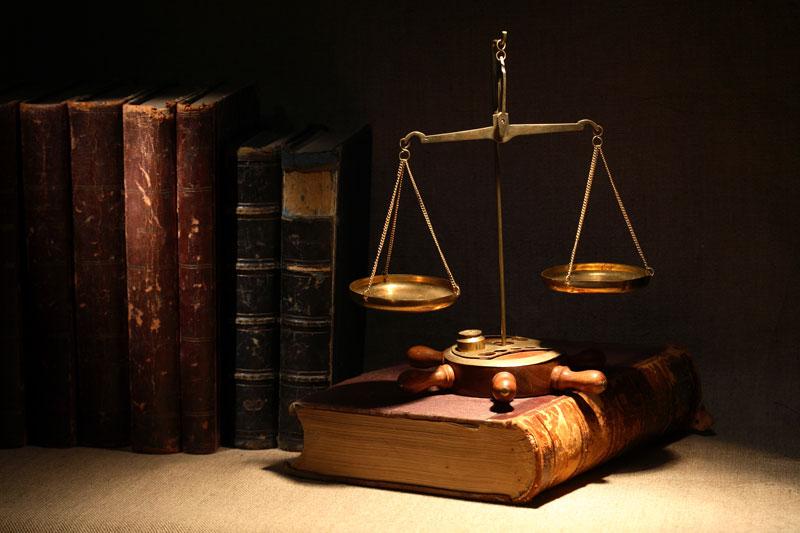[Adapted from Rothbard’s book review of Freedom and the Law by Bruno Leoni. This review first appeared in New Individualist Review, edited by Ralph Raico.]
[In his book Freedom and the Law,] Professor [Bruno] Leoni’s major thesis is that even the staunchest free-market economists have unwisely admitted that laws must be created by governmental legislation; this concession, Leoni shows, provides an inevitable gateway for State tyranny over the individual. The other side of the coin to increasing intervention by government in the free market has been the burgeoning of legislation, with its inherent coercion by a majority—or, more often, by an oligarchy of pseudo-“representatives” of a majority—over the rest of the population. In this connection, Leoni presents a brilliant critique of F.A. Hayek’s recent writings on the “rule of the law.” In contrast to Hayek, who calls for general legislative rules as opposed to the vagaries of arbitrary bureaucracy or of “administrative law,” Leoni points out that the real and underlying menace to individual freedom is not the administrator but the legislative statute that makes the administrative ruling possible. It is not enough, demonstrates Leoni, to have general rules applicable to everyone and written down in advance; for these rules themselves may—and generally do—invade freedom.
Leoni’s great contribution is to point out to even our staunchest laissez-faire theorists an alternative to the tyranny of legislation. Rather than accept either administrative law or legislation, Leoni calls for a return to the ancient traditions and principles of “judge-made law” as a method of limiting the State and insuring liberty. In the Roman private law, in the Continental Civil Codes, in the Anglo-Saxon common law, “law” did not mean what we think today: endless enactments by a legislature or executive. “Law” was not enacted but found or discovered; it was a body of customary rules that had, like languages or fashions, grown up spontaneously and purely voluntarily among the people. These spontaneous rules constituted “the law”; and it was the works of experts in the law—old men of the tribe, judges, or lawyers—to determine what the law was and how the law would apply to the numerous cases in dispute that perpetually arise.
If legislation is replaced by such judge-made law, says Leoni, fixity and certainty (one of the basic requirements of the “rule of law”) will replace the capriciously changing edicts of statutory legislation. The body of judge-made law changes very slowly; furthermore, since judicial decisions can only be made when parties bring cases before the courts, and since decisions properly apply only to the particular case, judge-made law—in contrast to legislation—permits a vast body of voluntary, freely-adopted rules, bargains, and arbitrations to proliferate as needed in society. Leoni brilliantly shows the analogy between these free rules and bargains, which truly express the “common will” of all participants, and the voluntary bargains and exchanges of the free market. The twin of the free-market economy, then, is not a democratic legislature ever grinding out new diktats for society, but a proliferation of voluntary rules interpreted and applied by experts in the law.
While Leoni is vague and wavering on the structure that his courts would take, he at least indicates the possibility of privately competing judges and courts. To the question, who would appoint the judges? Leoni answers with the question, who now “appoints” the leading doctors or scientists in society? They are not appointed, but gain general and voluntary acceptance on their merits. Similarly, while in some passages Leoni accepts the idea of a governmental supreme court, which he admits becomes itself a quasi-legislature, he does call for the restoration of the ancient practice of separation of government from the judicial function. If for no other reason, Professor Leoni’s work is extremely valuable for raising, in our State-bemused age, the possibility of a workable separation of the judicial function from the State apparatus.
A great defect in Leoni’s thesis is the absence of any criterion for the content of the judge-made law. It is a happy accident of history that a great deal of private law and common law is libertarian—that they elaborate the means of preserving one’s person and property against “invasion”—but a good deal of the old law was antilibertarian, and certainly custom can not always be relied on to be consistent with liberty. Ancient custom, after all, can be a frail bulwark indeed; if customs are oppressive of liberty, must they still serve as the legal framework permanently, or at least for centuries? Suppose ancient custom decrees that virgins be sacrificed to the gods by the light of the full moon, or that redheads be slaughtered as demons? What then? May not custom be subject to a higher test—reason?
The common law contains such antilibertarian elements as the law of “conspiracy,” and the law of “seditious libel” (which outlawed criticism of the government), largely injected into the law by kings and their minions. And perhaps the weakest aspect of the volume is Leoni’s veneration for the Roman law; if the Roman law provided a paradise of liberty, how account for the crushing taxation, the periodic inflation and currency debasement, the repressive network of controls and “welfare” measures, the unlimited imperial authority, of the Roman Empire?
Leoni offers several different criteria for the content of the law, but none are very successful. One is unanimity. But while superficially plausible, even explicit unanimity is not necessarily libertarian; for, suppose that there are no Moslems in a country, and everyone unanimously decides—and it passes into custom—that all Moslems should be put to death. And what if, later, a few Moslems should appear in the land? Further, as Leoni recognizes, there is the problem of the criminal; certainly he does not join in favoring his own punishment. Here Leoni falls back on a tortured construction of implicit unanimity, i.e., that, in such a case as murder or theft, the criminal wouldagree to the punishment if anyone else were the criminal, so that he really agrees to the justice of the law. But suppose that this criminal, or others in the community, have the philosophical belief that certain groups of people (be they redheads, Moslems, landlords, capitalists, generals, or whatnot) deserve to be murdered. If the victim is a member of one of these abhorred groups, then neither the criminal nor others holding this belief would agree to the justice of either the general law against murder or to the punishment of this particular murderer. On this ground alone, the implicit-unanimity theory must fall.
A second proffered criterion for the content of the law is the negative Golden Rule: “Do not unto others what you would not wish them to do unto you.” But this too is unsatisfactory. For one thing, some acts generally considered criminal would still pass the negative Golden Rule test: thus, a sadomasochist can torture another person, but since he would be delighted to be tortured, his act, under the negative Golden Rule, could not be considered criminal. On the other hand, the Golden Rule is much too wide a criterion; many acts would be condemned as criminal that certainly should not be. Thus, the Rule decrees that men shouldn’t lie to each other (a man would not want to be lied to) and yet few would urge that all lies be outlawed. Also, the Golden Rule would decree that no man should turn his back on a beggar, because the former would not want the beggar to turn his back on him were they to change places—and yet it is hardly libertarian to outlaw the refusing of alms to a beggar.
Leoni hints at a much more promising criterion: that freedom be defined as the absence of constraint or coercion—except against constrainers. In this case, the initiation of coercion is outlawed, and the “governmental” function becomes strictly limited to coercing the coercers. But, most unfortunately, Leoni falls into the very same trap that snared Hayek in his Constitution of Liberty: “coercion” or “constraint” is not defined in a proper or cogent manner. At first, Leoni gives promise of a correct understanding of coercion when he says that a man cannot be said to “constrain” another when he refuses to buy the latter’s goods or services, or when he refuses to save a drowning man. But then, in his unfortunate chapter 8, Leoni concedes that constraint may occur when a religiously devout person feels “constrained” because another man does not observe the former’s religious practices. And this feeling of constraint may appear to justify such invasions of liberty as Sunday blue laws. Here again, Leoni errs in placing his test of constraint or coercion not on the objective acts of the defendant but on the subjective feelings of the plaintiff. Surely this is an extremely wide highroad for tyranny!
Furthermore, Leoni apparently does not see that taxation is a prime example of coercion, and is hardly compatible with his own picture of the free society. For if coercion is to be confined to the coercers, then surely taxation is the unjust coercive extraction of property from a vast body of non coercing citizens. How, then, is it to be justified? Leoni, again in chapter 8, also concedes the existence of some legislation in his ideal society, including, mirabile dictu, some nationalized industries! One specific nationalization favored by Leoni is the lighthouse industry. His argument is that a lighthouse could not charge individual consumers for its service, and that therefore it should be supplied by government.
The basic answers to this argument are threefold:
1. the taxation for lighthouses imposes coercion and is therefore an invasion of freedom;
2. even if the lighthouse could not charge individuals, what prevents shipping lines from constructing or subsidizing their own lighthouses? The usual reply is that then various “free riders” would benefit from the service without paying. But this is universally true in any society. If I make myself a better person, or if I tend my garden better, I am adding to the benefits enjoyed by other people. Am I then entitled to levy tribute upon them because of this happy fact?
3. In fact, lighthouses could easily charge ships for their services, if they were permitted to own those surfaces of the sea which they transform by their illumination. A man who takes unowned land and transforms it for productive use is readily granted ownership of that land, which can henceforth be used economically; why should not the same rule apply to that other natural resource, the sea? If the lighthouse owner were granted ownership of the sea surface that he illuminates, he could then charge each ship as it passes through. The deficiency here is a failure not of the free market but of the government and the society in not granting a property right to the rightful owner of a resource.
On the necessity of taxing for government lighthouses and other services, Leoni adds the astonishing comment that “in these cases the principle of free choice in economic activities is not abandoned or even put in doubt.” (p. 171) Why? Because “it is admitted” that people would be willing to pay for these services anyway, if available on the market. But who admits it, and to what extent? And which people would pay?
Our problem can be solved, however; a cogent criterion does exist for the content of libertarian law. That criterion defines coercion or constraint, simply, as the initiation of violence, or the threat thereof, against another person. It then becomes clear that the use of coercion (violence) must be confined to coercing the initiators of violence against their fellow men. One reason for confining our attention to violence is that the unique weapon employed by government (or by any other enforcing agency against crime) is precisely the threat of violence. To “outlaw” any action is precisely to threaten violence against anyone who commits it. Why not then use violence only to inhibit those who are initiating violence, and not against any other action or nonaction that somebody might choose to define as “coercion” or “constraint”?
And yet the tragic puzzle is that so many quasi-libertarian thinkers have, over the years, failed to adopt this definition of constraint or have failed to limit violence to counteracting violence, and have instead opened the door to statism by using such vague, jumbled concepts as “harm,” “interference,” “feelings of constraint,” etc. Decree that no violence may be initiated against another man, and all the loopholes for tyranny which even such men as Leoni concede—blue laws, government lighthouses, taxation, etc., —would be swept away.
In short, there exists another alternative for law in society, an alternative not only to administrative decree or statutory legislation, but even to judge-made law. That alternative is the libertarian law, based on the criterion that violence may only be used against those who initiate violence, and based therefore on the inviolability of the person and property of every individual from “invasion” by violence. In practice, this means taking the largely libertarian common law, and correcting it by the use of man’s reason, before enshrining it as a permanently fixed libertarian code or constitution. And it means the continual interpretation and application of this libertarian law code by experts and judges in privately competitive courts.
Professor Leoni concludes his highly stimulating and important book by saying that “law-making is much more a theoretical process than an act of will” (p. 189). But certainly a “theoretical process” implies the use of man’s reason to establish a code of law that will be an unbreachable and unflawed fortress for human liberty.
Murray N. Rothbard (1926–1995) was dean of the Austrian School. He was an economist, economic historian, and libertarian political philosopher. Republished from Ludwig von Mises Institute under Creative Commons License 3.0.
*Image via Shutterstock



